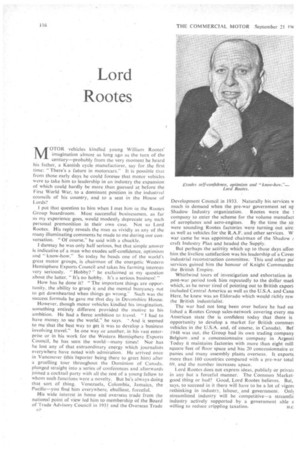Lord Rootes
Page 118

If you've noticed an error in this article please click here to report it so we can fix it.
MOTOR vehicles kindled young William Rootes' imagination almost as long ago as the turn of the century—probably from the very moment he heard his father, a Kentish cycle manufacturer, say for _the first time: "There's a future in motorcars." It is possible that from those early days he could foresee that motor vehicles were to take him to leadership in an industry the expansion of which could hardly be more than guessed at before the First World War, to a dominant position in the industrial councils of his country, and to a seat in the House of Lords?
I put that question to him when I met him in the Rootes Group boardroom. Most successful businessmen, as far as my experience goes, would modestly deprecate any such personal premonition in their own case. Not so Lord Rootes. His reply reveals the man as vividly as any of the many illuminating comments he made to me during our conversation. "Of course,he said with a chuckle.
1 daresay he was only half serious, but that simple answer is indicative of a man who exudes self-confidence. optimism and "know-how." So today he heads one of the world's great motor groups, is chairman of the energetic Western Hemisphere Exports Council and takes his farming interests very seriously. "Hobby? " he exclaimed at my question about the latter. "It's no hobby. It's a serious business!
How has he done it? "The important things are opportunity, the ability to grasp it and the mental buoyancy not to get downhearted when things go wrong.Such was the success formula he gave me that day in Devonshire House.
However, though motor vehicles kindled his imagination, something entirely different provided the motive to his ambition. He had a fierce ambition to travel, " I had to have money to see the world," he says. " And it seemed to me that the best way to get it was to develop a business involving travel." In one way or another, in his vast enterprise or in his work for the Western Hemisphere Exports Council, he has seen the world—many times! Nor has he lost any of that extraordinary energy which journalists everywhere have noted with admiration. He arrived once in Vancouver (this reporter being there to greet him) after a gruelling tour throughout the Dominion of Canada, plunged straight into a series of conferences and afterwards joined a cocktail party with all the zest of a young fellow to whom such functions were a novelty. But he's always doing that sort of thing. Venezuela, Colombia, Jamaica, the Pacific—you find him everywhere, ebullient. forceful.
His wide interest in home and overseas trade from the national point of view led him to membership of the Board of Trade Advisory Council in 1931 and the Overseas Trade Gs Development Council in 1933. Naturally his services IA much in demand when the pre-war government set up
Shadow Industry organization. Rootes were the 1 company to enter the scheme for the volume manufact of aeroplanes and aero-engines. By the time the sit were sounding Rootes factories were turning out airc as well as vehicles for the R.A.F. and other services. W war came he was appointed chairman of the Shadow i craft Industry Plan and headed the Supply.
But perhaps the activity which up to those days affon him the liveliest satisfaction was his leadership of a Covet industrial reconstruction committee. This and other pul services gained him the honour of Knight Commander the British Empire.
Whirlwind tours of investigation and exhortation in post-war period took him repeatedly to the dollar marl which, as he never tired of pointing out to British export included Central America as well as the U.S.A. and Cana Here, he knew was an Eldorado which would richly rew the British industrialist.
The war had not long been over before he had est lished a Rootes Group sales-network covering every ma American state (he is confident today that there is opportunity to develop a market for British commen vehicles in the U.S.A. and, of course, in Canada). Bef 1948 was out, the Group had its own trading company Belgium . and a concessionnaire company in Argenti Today it maintains factories with more than eight mill square'reet of floor space and has 20 concessionnaire cc panies and many assembly plants overseas. It exports more than 160 countries compared with a pre-war total 69, and the number increases apace.
Lord Rootes does not express ideas, publicly or privatt in any but a forceful manner. The Common Marketgood thing or bad? Good, Lord Rootes believes. But, says, to succeed in it there will have to be a lot of vigori rethinking in industry, labour,. and government. Onh streamlined industry will be competitive—a streamlit industry actively supported by a government able o willing to reduce crippling taxation. H.0










































































































































































































































































































































